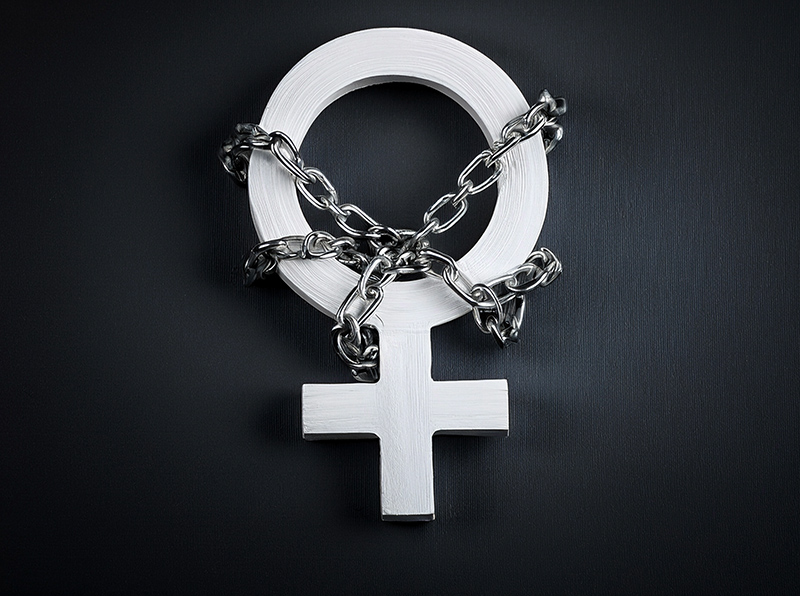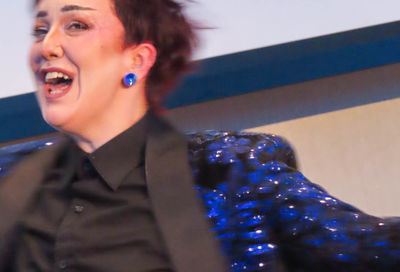Heartbreak Hotel
There's something fresh in Mariusz Trelinski's rebellious view of a Puccini classic usually handled with kid gloves
It’s awfully hard not to smile when presented with director Mariusz Trelinski’s modern take on Giacomo Puccini’s highly revered classic, La Boheme. There is something very fresh in this rebellious view of an opera usually handled with the kind of kid gloves afforded an antique music box.
In this circa-now version, tragic love springs from a warehouse-dwelling group of European bohemians — or Eurobos (have I coined a new term?) — replete with digital goodies and mega-white couch. Our familiar Colline is re-invented wearing a Palestinian scarf and mirrored sunglasses; Rodolfo goes ultra-continental in body-hugging Euro garb; and Mimi comes with her candle sporting a wide-leg pantsuit. What’s not to like?
Of course, some opera buffs simply will not go for this kind of time travel, and granted, it doesn’t all work all the time. But it does work, overall. With such strong leads and Trelinski’s very keen and tight hold on Mimi’s tragedy, this Boheme is no less emotive and engaging than any traditional version. And at times, it is stunningly and hauntingly original. When Rodolfo picks up his camcorder and begins filming Mimi as she sings, the projections add greatly to the pathos of Mimi as we watch what will become her digitalized memory. Later, as Mimi wanders the corrugated steel walls of a nightclub in the early hours to sing of hope and despair Trelinski achieves a most memorable piece of imagery informed by contemporary experience.
Crucially, the props are never overdone. Nor do they ever upstage the glories of Puccini’s score. When Rodolfo and Mimi sing their Act III duet, in which they promise to stay together until the coming of spring, their voices transcend time and place and enter completely the exquisite music. The costuming, the bits and bobs on stage, no longer matter.
Of course, these moments would not come without the superb singing of Vittorio Grigolo as Rodolfo and Adriana Damato as Mimi. Though Grigolo is a most unabashed chewer of scenery (with a penchant for thrashing like a fish caught on a hook), luckily, singing calms him down. And indeed, when he sings, all can be forgiven. Grigolo has a gorgeous tenor with the kind of tone that magically suggests both earthy vigor and nobility. When he opens up in the higher register, it’s sheer bliss.
Damato, though somewhat hesitant at first, settles in to deliver an exceedingly sweet, fully-round and rich soprano. She is a poised and understated actor and she imbues her Mimi with believability, even when logic tells us that, surely, she could find some decent medical care.
Soprano Nicole Cabell as Mimi’s flighty friend Musetta is somewhat less convincing. Cabell has a softly-carved and textured voice and it seems all wrong for this Musetta who is played as something of a Dominatrix. Similarly, Hyung Yun as Marcello is miscast, being nearly lost in the crowd both physically and vocally. Bass Paolo Pecchioli, on the other hand, gives a visually strong performance as Colline and comes into his own at the end of the opera with some nicely honed phrasings steeped in his deep vocal riches.
| LA BOHEME Kennedy Center Opera House Sept. 23, 25, 29 & 30 Free Live Simulcast on the National Mall Sept. 23 202-295-2400 www.dc-opera.org |
There are a few scenes that just don’t work. Trelinski’s turning of Act II’s café scene into a kind of anything goes cabaret-cum-costume party with Divine at one table and Batman at another breaks the fiction and the wonderfully crafted mood. Even more problematic is Mimi’s death scene. First, the surtitles — which until this point have been liberally translated into (someone’s idea of) modern lingo — suddenly revert to the year 1896 with the excruciating result that Mimi asks for, and actually gets, a ”muff.” Hello? Then, as Mimi graces the white couch in her final moments, the entire ensemble suddenly turn into waxworks dummies while Rodolfo, who has been doting all over the dying Mimi, amazingly fails to notice that the love of his life has literally flopped over dead less than a foot behind him. It’s a bit of overcooked choreography that takes the pathos right out of Grigolo’s [Mimi’s], if not the orchestral, finale.
Nevertheless, thanks to Puccini, there are many other moments of sublime heartbreak in which to revel. And this remains a very special Boheme — entertaining, original and accessible.
Support Metro Weekly’s Journalism
These are challenging times for news organizations. And yet it’s crucial we stay active and provide vital resources and information to both our local readers and the world. So won’t you please take a moment and consider supporting Metro Weekly with a membership? For as little as $5 a month, you can help ensure Metro Weekly magazine and MetroWeekly.com remain free, viable resources as we provide the best, most diverse, culturally-resonant LGBTQ coverage in both the D.C. region and around the world. Memberships come with exclusive perks and discounts, your own personal digital delivery of each week’s magazine (and an archive), access to our Member's Lounge when it launches this fall, and exclusive members-only items like Metro Weekly Membership Mugs and Tote Bags! Check out all our membership levels here and please join us today!























